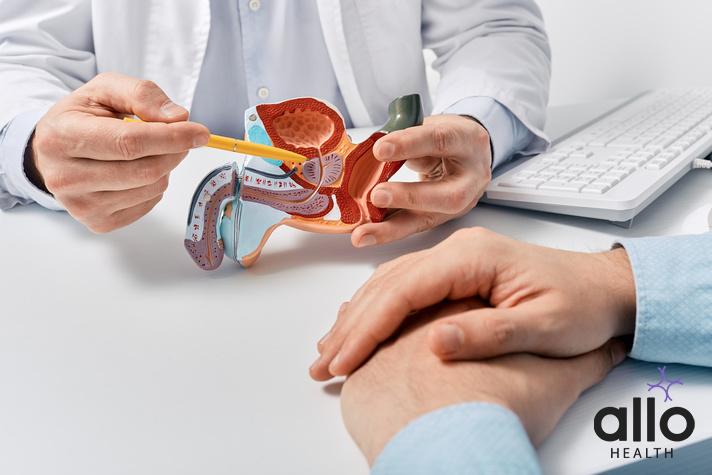Why Can’t I Keep an Erection?

Allo Health is dedicated to personalized well-being, offering support and trusted information tailored to individual health goals. The platform emphasizes human-generated content, led by a distinguished medical team of experts, including physicians and sexual health specialists. Their commitment to credibility involves rigorous fact-checking, authoritative research, and continuous updates to ensure accurate, up-to-date information. Allo Health's unique approach goes beyond conventional platforms, providing expert-led insights and a continuous commitment to excellence, with user feedback playing a crucial role in shaping the platform's authoritative voice.

Dr. Aditi completed her undergraduate medical education at AJIMS, Mangalore, after which she worked in multi-speciality hospitals with COVID patients and in the Pain and Palliative medicine department. Driven by her experiences, she developed a keen interest in psychiatry. Dr. Aditi believes that mental health is just as, if not more important, than physical health.
Why This Was Upated?
Our experts continually monitor the health and wellness space, and we update our articles when new information became available.
Updated on 17 April, 2024
- Article was updated as part of our commitment to diversity, equity, and inclusion.

"The following blog article provides general information and insights on various topics. However, it is important to note that the information presented is not intended as professional advice in any specific field or area. The content of this blog is for general educational and informational purposes only.
Book consultation
The content should not be interpreted as endorsement, recommendation, or guarantee of any product, service, or information mentioned. Readers are solely responsible for the decisions and actions they take based on the information provided in this blog. It is essential to exercise individual judgment, critical thinking, and personal responsibility when applying or implementing any information or suggestions discussed in the blog."
As men, experiencing sexual dysfunction can be a frustrating and emotionally taxing experience. The inability to keep an erection during intercourse, or erectile dysfunction (ED), can be caused by a variety of factors. Understanding the causes and solutions is the first step to addressing and treating the concern.
Why Can’t I Keep An Erection?
There are various factors that could contribute to difficulties keeping an erection firm. Individual experiences may vary, and consulting with a healthcare professional is advisable for personalised advice. Some potential reasons could include:
- Physical Health Issues: Medical conditions like heart disease, diabetes, high blood pressure, hormonal imbalances or erectile dysfunction can impact erectile function.
- Psychological Factors: Stress, anxiety, depression, or other mental health concerns can affect sexual performance.
- Relationship Issues: Problems in the relationship, communication issues, or emotional disconnect can impact sexual well-being.
- Lifestyle Factors: Smoking, excessive alcohol consumption, lack of exercise, and poor diet may contribute to erectile difficulties.
- Medications: Some medications may have side effects that impact sexual function. Consult with a healthcare professional if you suspect this.
- Age: Aging can contribute to changes in sexual function.
It’s crucial to address these concerns with a healthcare provider who can provide personalised advice based on your specific situation. Remember, seeking professional help is an essential step in understanding and addressing any concerns related to sexual health.
How Do I Know If I Need Medical Attention?
While this is not a substitute for professional medical advice, there are certain signs that may indicate you should seek medical attention for concerns related to sexual health. If you experience any of the following, it’s advisable to consult with a healthcare professional:
- Persistent Erectile Concerns: If you consistently face difficulties with sexual function, such as maintaining an erection, it’s essential to discuss this with a healthcare provider.
- Sudden Changes: Any sudden or unexplained changes in sexual performance, desire, or physical function should be addressed with a medical professional.
- Pain or Discomfort: If you experience pain or discomfort during sexual activity, it’s important to seek medical advice.
- Underlying Health Conditions: If you have existing health conditions such as diabetes, heart disease, or hormonal imbalances, and notice changes in sexual function, consult with your healthcare provider.
- Emotional Impact: If concerns about sexual health are causing emotional distress, anxiety, or depression, it’s crucial to seek support from a healthcare professional or mental health provider.
- Medication Side Effects: If you suspect that medications you’re taking may be affecting your sexual health, discuss this with your doctor to explore alternative options.
Remember, open communication with a healthcare professional is key to addressing concerns and finding appropriate solutions.

What is Erectile Dysfunction?
- One possible reason why you may be unable to keep an erection maybe Erectile Dysfunction.
- Erectile Dysfunction (ED) is a condition characterised by the consistent inability to achieve or maintain an erection sufficient for satisfactory sexual performance.
- Occasional difficulty with erections is not uncommon, and many factors, including stress or fatigue, can contribute to temporary episodes.
- However, when the problem becomes persistent, it may be classified as erectile dysfunction.
Symptoms of Erectile Dysfunction
The primary symptom of ED is difficulty with the following aspects of sexual function:
- Difficulty Achieving Erection: Inability to attain an erection during sexual arousal or stimulation.
- Difficulty Maintaining Erection: Inability to sustain an erection throughout the duration of sexual activity.
- Reduced Sexual Desire: While the primary focus of ED is on difficulties with erections, some individuals may also experience a decrease in sexual desire or libido.
Experiencing difficulty with erections from time to time is not uncommon and may not necessarily indicate ED. However, when these difficulties become persistent and impact sexual satisfaction, it’s advisable to seek medical attention.
Other signs and factors that may be associated with ED include:
- Emotional Distress: Feelings of frustration, embarrassment, or anxiety related to sexual performance.
- Relationship Strain: Difficulties or strain in intimate relationships due to sexual concerns.
- Underlying Health Conditions: ED can be linked to underlying health issues such as diabetes, cardiovascular disease, or hormonal imbalances.
- Lifestyle Factors: Unhealthy lifestyle choices, such as smoking, excessive alcohol consumption, lack of physical activity, and poor diet, may contribute to ED.
If you’re experiencing persistent symptoms of ED, it’s crucial to consult with a healthcare professional. They can help determine the underlying causes and recommend appropriate treatments or interventions tailored to your specific situation.
Causes of Erectile Dysfunction
Erectile Dysfunction (ED) can have various causes, and it’s often a result of a combination of physical, psychological, and lifestyle factors.
Physical Health Conditions:
- Cardiovascular diseases (e.g., atherosclerosis)
- Diabetes
- Hypertension (high blood pressure)
- Hormonal disorders (e.g., low testosterone levels)
- Obesity
- Metabolic syndrome
- Parkinson’s disease
- Multiple sclerosis
- Peyronie’s disease (development of scar tissue inside the penis)
Psychological Factors:
- Stress
- Anxiety
- Depression
- Relationship issues
- Performance anxiety
Lifestyle Factors:
- Smoking
- Excessive alcohol consumption
- Substance abuse
- Lack of physical activity
- Poor diet and nutrition
Medications:
Some prescription medications, such as antidepressants, antihypertensives, and certain prostate cancer treatments, may have side effects that contribute to ED.
Injury or Surgery:
- Pelvic or spinal cord injuries
- Surgeries in the pelvic area, especially those involving the prostate or bladder
Neurological Disorders:
Conditions affecting the nervous system, such as stroke or Alzheimer’s disease
Age:
Advanced age can be a contributing factor as natural changes in the body occur over time.
Sleep Disorders:
Conditions like sleep apnea may be associated with an increased risk of ED.

Diagnosing ED
Diagnosing Erectile Dysfunction (ED) typically involves a combination of medical history assessment, physical examination, and sometimes additional tests. Here’s an overview of the diagnostic process:
Medical History:
Your healthcare provider will likely start by discussing your medical history, including any existing health conditions, medications you’re taking, and details about your sexual history.
Be prepared to provide information about your lifestyle factors, such as smoking, alcohol consumption, exercise habits, and diet.
Physical Examination:
A physical examination may be conducted to assess general health and identify any physical factors that could contribute to ED.
This may involve examining the genital area, assessing blood pressure, and checking for signs of hormonal or neurological issues.
Laboratory Tests:
Blood tests may be performed to check for underlying health conditions such as diabetes, hormonal imbalances, or cardiovascular disease.
A blood test to measure testosterone levels may also be conducted.
Psychological Assessment:
As underlying psychological conditions can contribute to ED, your healthcare provider may inquire about stress, anxiety, depression, or relationship issues.
A mental health assessment may be recommended in some cases.
Nocturnal Penile Tumescence (NPT) Test:
This test measures spontaneous erections that occur during sleep. It can help differentiate between psychological and physical causes of ED.
Duplex Ultrasound:
This test involves using ultrasound to evaluate blood flow to the penis. It can help identify issues with blood vessels that may contribute to ED.
Injection Test:
A healthcare provider may inject a drug directly into the penis to induce an erection. This helps assess the blood flow and the ability of the penile tissues to trap blood.
The specific diagnostic approach may vary based on individual circumstances. It’s important to communicate openly with your healthcare provider and participate in the diagnostic process to ensure accurate and personalised recommendations for treatment
Treatments for Erectile Dysfunction
Treatment options for Erectile Dysfunction (ED) can vary depending on the underlying causes and individual health factors.
Lifestyle Changes:
- Healthy Diet: Adopting a balanced and nutritious diet can contribute to overall health, including sexual health.
- Regular Exercise: Physical activity can improve blood flow and help maintain a healthy weight.
- Quitting Smoking: Smoking can damage blood vessels and contribute to ED. Quitting can have positive effects on vascular health.
Psychological Counseling:
Counseling or therapy may be beneficial for addressing psychological factors contributing to ED, such as stress, anxiety, or relationship issues.
Medications:
- Phosphodiesterase-5 (PDE5) Inhibitors: Drugs like sildenafil (Viagra), tadalafil (Cialis), vardenafil (Levitra), and avanafil (Stendra) are commonly prescribed and work by increasing blood flow to the penis.
- Alprostadil: This medication can be administered as an injection or suppository to increase blood flow to the penis.
- Testosterone Replacement Therapy: If low testosterone levels are identified, hormone replacement may be considered.
Vacuum Erection Devices (VEDs):
A vacuum erection device is a non-invasive option that uses suction to draw blood into the penis, creating an erection. A constriction ring is then placed at the base to maintain the erection.
Penile Implants:
In cases where other treatments are ineffective, surgical implants may be considered. These can be inflatable or malleable and are placed within the penis.
Hormone Therapy:
Addressing hormonal imbalances, such as low testosterone, may be an option through hormone replacement therapy.
Alternative Therapies:
Some individuals explore alternative therapies such as acupuncture or herbal supplements. However, the effectiveness of these approaches is not well-established, and it’s essential to consult with a healthcare professional before trying them.
It’s crucial to consult with a qualified healthcare professional to determine the most suitable treatment for your specific situation.

Key Takeaways
- Experiencing sexual dysfunction, like Erectile Dysfunction (ED), can be emotionally taxing for men.
- Various factors, including physical health issues, psychological factors, and lifestyle choices, can contribute to difficulty maintaining an erection.
- Signs that may indicate a need for medical attention include persistent concerns, sudden changes, pain during sexual activity, and emotional distress.
- Erectile Dysfunction is characterized by difficulty achieving or maintaining an erection sufficient for satisfactory sexual performance.
- Causes of ED range from physical health conditions and psychological factors to lifestyle choices and age-related changes.
- Diagnosing ED involves a thorough medical history, physical examination, laboratory tests, and may include psychological assessments by a mental health professional. Treatment options include lifestyle changes, medications, vacuum erection devices, and surgical interventions like penile implants.
Frequently Asked Questions
Q: What are the risk factors of Erectile Dysfunction?
A: Risk factors for ED include age, underlying health conditions like diabetes and cardiovascular disease, smoking, excessive alcohol consumption, and psychological factors such as stress and anxiety.
Q: What are some ED medicines?
A: Erectile dysfunction medications include Phosphodiesterase-5 (PDE5) inhibitors like sildenafil (Viagra), tadalafil (Cialis), and vardenafil (Levitra). They increase blood flow to the penis by relaxing the blood vessels in the erectile tissue. Alprostadil, available as injections or suppositories, also helps with erections by widening blood vessels.
Q: Can prostate surgery cause ED?
A: Prostate surgery, especially procedures like radical prostatectomy, can potentially cause Erectile Dysfunction (ED) due to damage to nerves and blood vessels involved in the erectile process. However, outcomes vary, and some individuals may recover over time.
Q: Can blood pressure medications cause ED?
A: Yes, certain blood pressure medications, particularly beta-blockers and diuretics, can contribute to Erectile Dysfunction (ED) as a side effect by affecting blood flow or hormonal levels. Consulting with a healthcare provider can help find alternative medications or solutions.






































